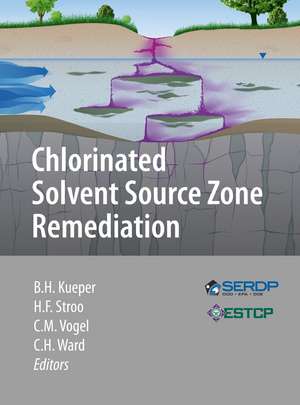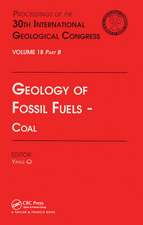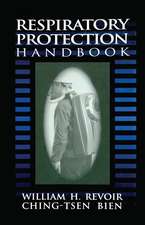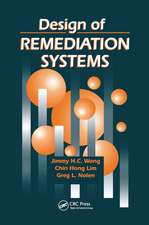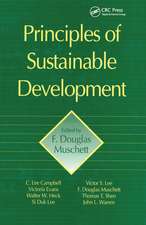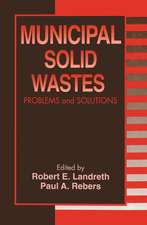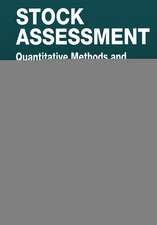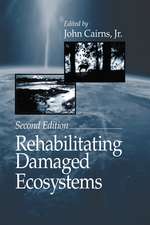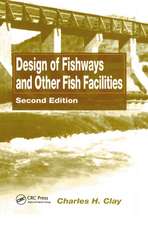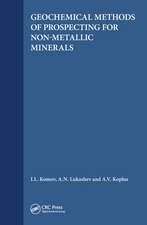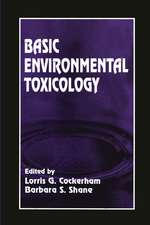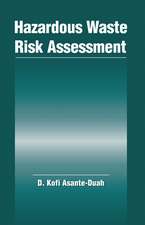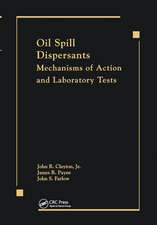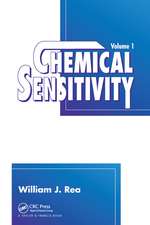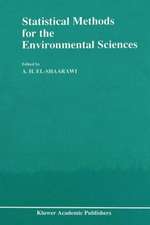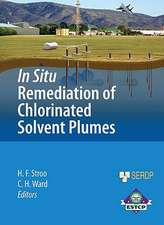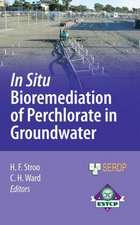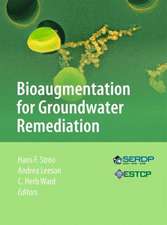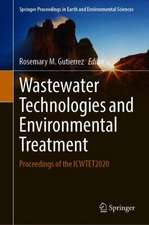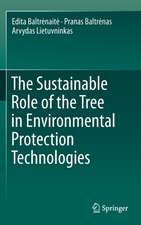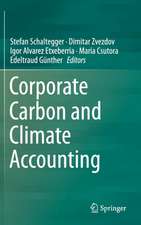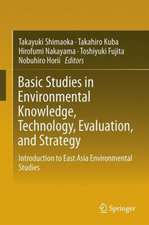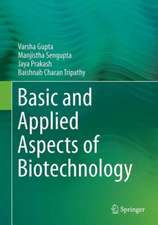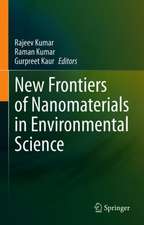Chlorinated Solvent Source Zone Remediation: SERDP ESTCP Environmental Remediation Technology, cartea 7
Editat de Bernard H. Kueper, Hans F. Stroo, Catherine M. Vogel, C. Herb Warden Limba Engleză Hardback – 23 apr 2014
Preț: 997.83 lei
Preț vechi: 1216.87 lei
-18% Nou
Puncte Express: 1497
Preț estimativ în valută:
190.93€ • 199.89$ • 157.99£
190.93€ • 199.89$ • 157.99£
Carte disponibilă
Livrare economică 15-29 martie
Preluare comenzi: 021 569.72.76
Specificații
ISBN-13: 9781461469216
ISBN-10: 146146921X
Pagini: 713
Ilustrații: LIII, 713 p. 214 illus., 203 illus. in color.
Dimensiuni: 193 x 260 x 36 mm
Greutate: 1.95 kg
Ediția:2014
Editura: Springer
Colecția Springer
Seria SERDP ESTCP Environmental Remediation Technology
Locul publicării:New York, NY, United States
ISBN-10: 146146921X
Pagini: 713
Ilustrații: LIII, 713 p. 214 illus., 203 illus. in color.
Dimensiuni: 193 x 260 x 36 mm
Greutate: 1.95 kg
Ediția:2014
Editura: Springer
Colecția Springer
Seria SERDP ESTCP Environmental Remediation Technology
Locul publicării:New York, NY, United States
Public țintă
ResearchCuprins
Preface.- State of the Practice.- The Source Zone Remediation Challenge.- DNAPL Source Zone Characterization and Delineation for Remediation.- Advanced Diagnostics.- Modeling Source Zone Remediation.- Modeling Plume Responses to Source Treatment.- Flux-Based Site Assessment and Management.- Hydraulic Displacement.- In Situ Chemical Oxidation.- In Situ Chemical Reduction.- Surfactant and Cosolvent Flushing.- In Situ Bioremediation of Sources.- Natural Attenuation of Sources.- In Situ Thermal Treatment of Sources.- Combining Remedies.- Cost Considerations for Source Treatment Technologies.- Alternative Management Strategies.- Research and Development Needs.- Index.
Textul de pe ultima copertă
Remediation of chlorinated solvent source zones is very difficult, at times controversial, and must be based on state-of-the-art knowledge of the behavior of nonaqueous phase liquids in the subsurface, as well as site specific geology, chemistry, biology and hydrogeology.
This volume begins with an overview of the current state-of-the-practice that serves as an introduction to the rest of the book. The second chapter summarizes the challenges involved in source zone remediation, which has been and remains contentious, expensive and difficult, for a variety of reasons. Following are chapters providing more focused discussions of specific aspects of this overall challenge:
· Two chapters on source zone characterization, the first summarizing the current issues and techniques, and the second focusing on several innovative diagnostic methods.
· Two chapters on modeling, the first focused on modeling source zone remediation itself, and the second focused on the responses of downgradient plumes to source remediation.
· A chapter on the use of mass flux and mass discharge information to improve source zone management and remediation.
· A series of chapters on specific source zone remediation methods, including hydraulic displacement and recovery, in situ chemical oxidation (ISCO), in situ chemical reduction (ISCR), enhanced flushing with cosolvents and surfactants, in situ bioremediation, and finally source zone monitored natural attenuation. · A chapter on combined remedies, discussing the fundamental issues involved in developing effective combined remedies.
· A chapter on the costs of source zone treatment, using several hypothetical site scenarios, comparing different technologies on a total and net present cost basis.
The last two chapters consider the future of source zone remediation, beginning with a discussion of alternate management strategies, followed by a summary of the research and development needed to improve the state of the practice.
Each chapter in this volume has been reviewed for technical content by two or more experts in each subject area covered. This volume will provide a useful reference for practitioners, researchers and students involved in remediation of chlorinated solvent source zones.
This volume begins with an overview of the current state-of-the-practice that serves as an introduction to the rest of the book. The second chapter summarizes the challenges involved in source zone remediation, which has been and remains contentious, expensive and difficult, for a variety of reasons. Following are chapters providing more focused discussions of specific aspects of this overall challenge:
· Two chapters on source zone characterization, the first summarizing the current issues and techniques, and the second focusing on several innovative diagnostic methods.
· Two chapters on modeling, the first focused on modeling source zone remediation itself, and the second focused on the responses of downgradient plumes to source remediation.
· A chapter on the use of mass flux and mass discharge information to improve source zone management and remediation.
· A series of chapters on specific source zone remediation methods, including hydraulic displacement and recovery, in situ chemical oxidation (ISCO), in situ chemical reduction (ISCR), enhanced flushing with cosolvents and surfactants, in situ bioremediation, and finally source zone monitored natural attenuation. · A chapter on combined remedies, discussing the fundamental issues involved in developing effective combined remedies.
· A chapter on the costs of source zone treatment, using several hypothetical site scenarios, comparing different technologies on a total and net present cost basis.
The last two chapters consider the future of source zone remediation, beginning with a discussion of alternate management strategies, followed by a summary of the research and development needed to improve the state of the practice.
Each chapter in this volume has been reviewed for technical content by two or more experts in each subject area covered. This volume will provide a useful reference for practitioners, researchers and students involved in remediation of chlorinated solvent source zones.
Caracteristici
The seventh volume in the SERDP series Represents the state of the practice of DNAPL source zone characterization, remediation and management Useful to the technical practitioner as well as the research scientist and engineer in the field Includes supplementary material: sn.pub/extras
